THE BLUE PEARL - Chefchaouen, Morocco
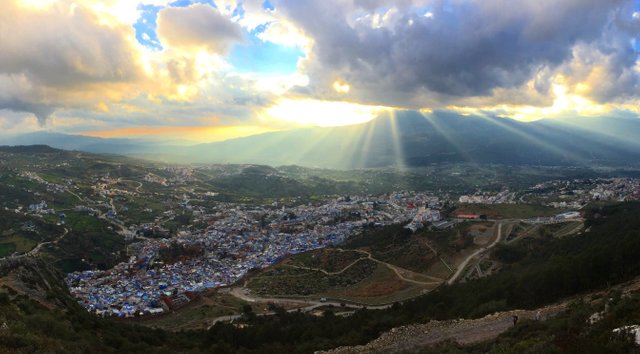
‘Head straight up the hill and past the Spanish mosque, don’t talk to anyone until you reach the village.’
That was the advice anyway.
At least, I suppose, this was a new variation on the guide scam. One that we’d have to acquiesce to if we were to score that sweet Chefchaouen kif at an even sweeter price. Our man, Kahled tagged on to the group as we headed uphill from the mosque and integrated himself with that same soft, easy kind of conversation that pulls in the unwary like a riptide. Of course he knew the two Germans from Hostel Aline, he had shown them around his family farm himself. Of course he would take us on a tour, no obligation, for the mountain people are nothing if not hospitable.
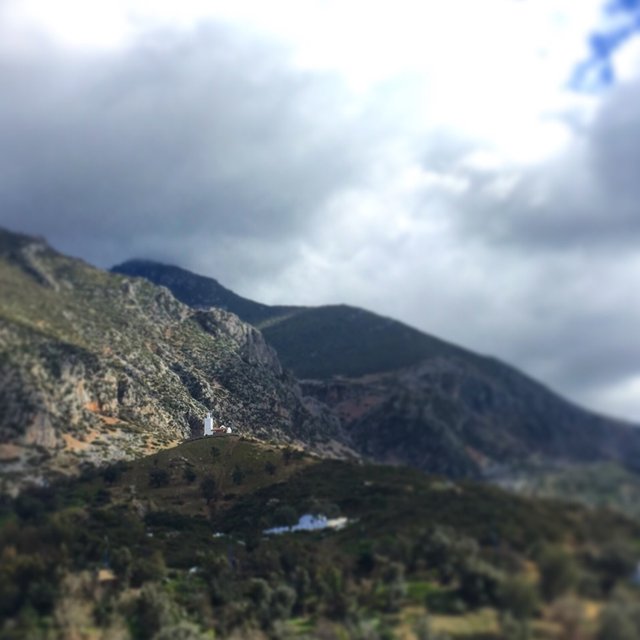
The ever visible Spanish mosque.
This particular farm was situated a half hour of steep, twisting paths and shoe-destroying rocks further up the hill side than the mosque but still patently short of any sort of village. A ramshackle combination of corrugated tin, clay bricks and recycled plastic containers, rather than being ushered inside we found ourselves in a half-built shed with three sacks of weed that could have doubled as sun-loungers. Chickens picked idly through the detritus which had drifted in through the open roof and I watched in bemusement as one ate a piece of hashish easily big enough to make for an entirely different kind of roast chicken.
From the very start our host seemed disengaged to the point of being cagey. Any questions were answered short in form and ever shorter in content. Soon a second host appeared, a man who was introduced to us as the owner but bore scant resemblance to Kahled. Armed with a pair of tights, two sticks, tiny enamelled bowl and a carrier bag we were informed these were are tools of the trade.
The older man proceeded to build himself a small stool from the flat, clay bricks before using the tights to put a double layer of gauze over the bowl. This ‘special filter’, we were informed, would separate the kif from the plant and with that a handful of cuttings were thrown onto the tights and a plastic bag wrapped around the whole set-up. Once set up correctly the process is simple; take the sticks and beat the contraption like a ginger stepchild. A process so easy in fact that it could be handed over to us as the host heads off to make tea.
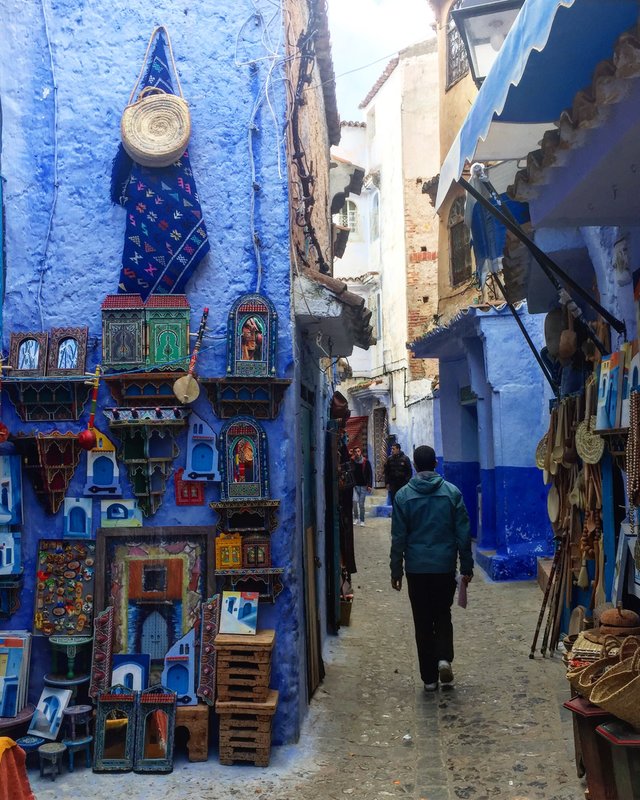
Blue-washed streets of Chefchaouen.
Whilst we took turns to hammer out a beat I took the opportunity to ask a few simple, or at least I thought so, questions.
‘So this is your farm?’ I started.
‘It is family farm,’ Came the first of many stunted replies. ‘We plant many small fields in different places to keep away from thieves and junkies.’
‘And have your family been growing hash for long? Many generations?’
‘Many.’
‘I see. And how many crops do you harvest a year?’
‘There are many grades. Best in summer, we call it ‘grade 00′. This,’ He motioned idly toward the sacks. ‘This is last crop, not so good.’
‘So different grades mean different prices, yes?’
‘Yes, but now is time for tea.’
With this abrupt sidestep our second host reappeared, battered tray in hand to dole out the refreshments like half-time oranges. After a short dialogue in Arabic he retrieved the bowl and headed back inside. Then with all the faux charm of a seasoned salesman Kahled effortlessly slipped into his well-worn spiel.
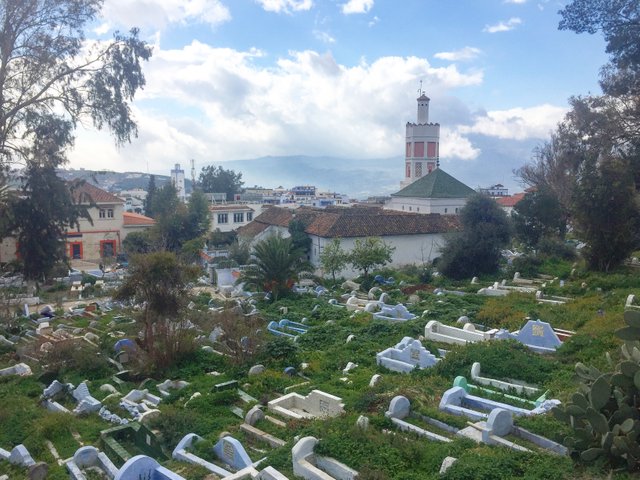
A traditional cemetery.
‘Now friends, you have seen the tour and enjoyed tea, we must talk business for he is very busy and must get back to work.’ He smiled.
‘Yes, of course, it’s what we are here for.’ I assured him. ‘But how much will it cost?’
‘Five grams, plus payment for the tour.’
‘I was hoping to get more than five grams. I’d like a quite a reasonable amount. How much would five grams cost?’
‘How much do you want? You can have five grams, you can have more!’
After a couple of minutes of this fruitless back-and-forth it was clear the conversation had become cyclic. Our new best friend, eyes alight with the thought of profit, was no more willing to commit to a price anymore than I was willing to show my hand.
So it was, with a mixed feelings of impatience, annoyance and a rapidly growing suspicion we may have chosen the wrong farm I mentioned the maximum I could possibly part with would be four hundred dirhams. But for that sizeable amount of cash I’d be looking for a whole lot more than five grams. After all, the proffered five grams was by no means a standard quantity but instead the amount we had managed to beat out ourselves.
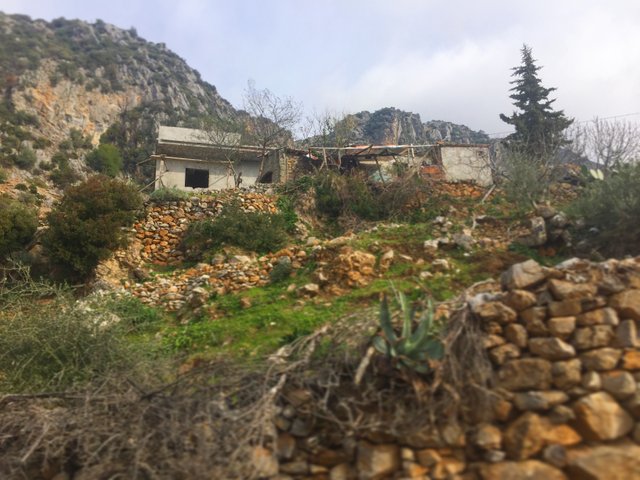
Kif farm or not a kif farm? Who knows.
It was at this point Kahled fell into a second dialogue with the owner. A conversation heavy in sharp words and irritated gestures in our direction. Prices and weights began to fluctuate with out rhyme or reason but never fell to something even resembling a good deal; ten for five hundred, six for four hundred and fifty. The owner meanwhile became ever more irritated, first packing away the tea set and then making it abundantly clear we should leave but not before paying for the pleasure of being shouted at.
This was unlikely to say the very least and we left to muttered comments about Europeans and how we take advantage of the hard-working common man. On reflecting, as we made our way back down to the blue pearl that is Chefchaouen, it was clear to all that the setup was an imitation of the real experience, a facade to take advantage of the gullible and easily intimidated. Khaled had even mentioned during the course of conversation that most of the people they see were Asian tourists and I shudder to think how many unwary groups have fallen foul of this aggressive tout.
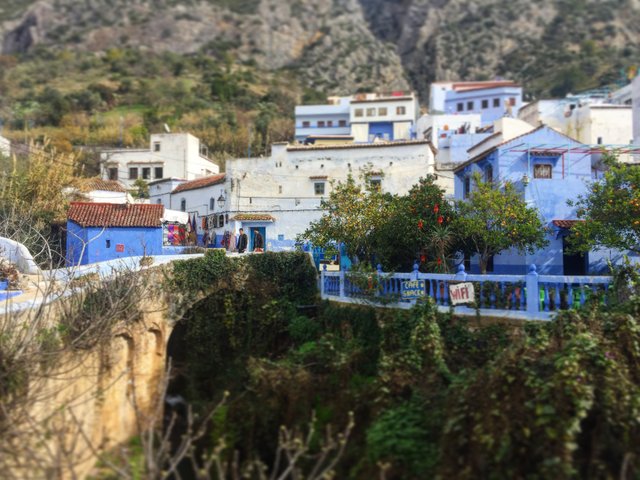
Mustapha’s - always worth a look.
Fortunately not only was this the single negative experience I encountered in nearly two weeks in the town but hashish is ridiculously easy to source in this area especially. Still the bitter taste remained and three days later I found myself, after a chance encounter with Kahled, once more explaining that it was his greed that had spoiled the deal and not some European agenda to stiff the locals and alight with the toils of their labour.
The next day I recounted the sorry tale to my friend Richard and a local man, Malek, whilst sat the sun-dappled patio of Mustafa’s. A place amongst the orange trees and along side the babbling brook where it is, if anything, too easy to wax lyrical on the problems of the world.
‘In Morocco,’ Malek chipped in. ‘We have a saying; your face is your price. Once you have been seen, once your nationality is known, the price is set. Even for me, as a local, if I arrive on my own I get a good price. But if I arrive with foreigner, even if they are my friend, we all must pay different price. It’s not good.
When assumptions such as these abound it’s hard not to question who is right or wrong. Perhaps it’s a question of perception when it comes to contributing to the local economy. Who is to say who’s fair is the correct fare? Certainly not me but what I will suggest is there is a better, and smarter, way of going about skinning this particular cat.
Days later, whilst sat at a viewpoint overlooking the port of Tangier, I was approached by an elderly gentleman. Dressed in fresh white linen, skullcap and traditional jellaba. He introduced himself as Abdallah, a son of the Kasbah.
‘Where are you from?’ He asked. ‘Ah England. I have worked in England. 1974, two years after Germany. I toured with a famous circus.
‘I was an acrobat. I would swing from the ceiling, do jumps, flips. I was the best. One day, when we make the pyramid, I am the smallest so I am at the top and the strongman begins to shake.
‘He had a younger brother who he wanted to take my job. I fall and break my bones from seventeen metres. I spend eighteen months in hospital and never go back to the circus. Instead I come home to the kasbah.
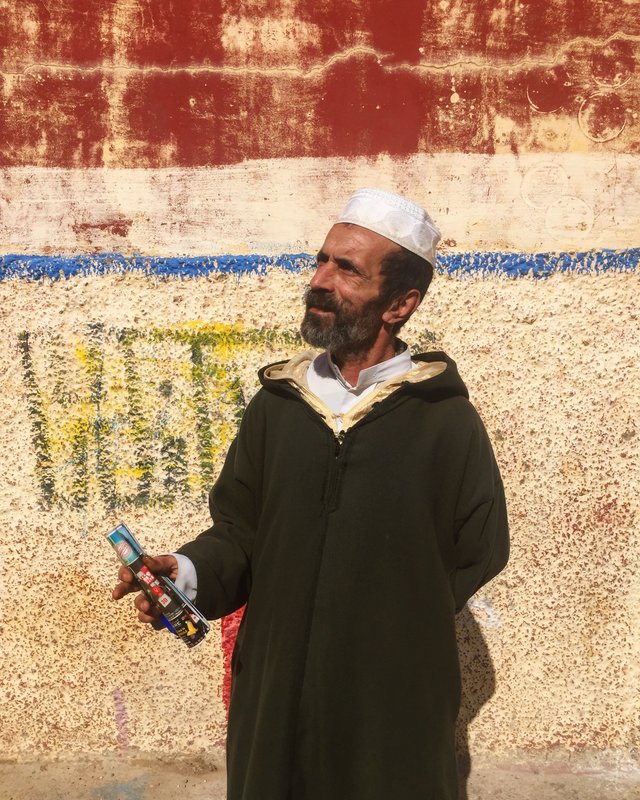
Abdallah insisted I take this photo. To this day I have no clue what he’s staring at.
‘The kasbah is very famous, many famous men live here. Jim Morrison, Mick Jagger. You know them?” He asks as he begins pulling out small squares of faded paper from his wallet. ‘I worked with them both.’
Sure enough the worn but well preserved clippings and Polaroids show a younger Abdallah alongside two of arguably the greatest musicians of the modern era. A fact hard not to be impressed by. As I hand back these treasured bit of paper he continues. ‘How about Jack Kerouac? William Burroughs? He used to live next to me whilst he wrote Naked Lunch. He was a drugs man. Perhaps I could show you, is only two minutes walk…’
Had it not been for a departing ferry I would have taken his arm off at the elbow and still marvelled at the skill with which he’d pitched his stall. This, I believe, in a country that relies on tourists to the point of near desperation, is the right way to do things. Instead, wanting to give a little something at least, I enquired as to wether he was a smoker, handed over my pack of redundant Marlboros and asked for directions through the twisting streets of the kasbah.
He insisted on showing me the way and gave a small tour in the process introducing me to hunched old ladies and cackling children alike. In the space of five short minutes this old man reminded me just how wonderful Morocco can be even when it wants something for it’s trouble.
*Would you like to read more and understand less? Fantastic! https://pisspoorplanning.wordpress.com
Congrats you won the daily Gogreenbuddy upvote worth roughly 50 cents! Keep writing like this and you will keep winning!
Fantastic! Thank you. I'll keep an eye out and hopefully this is just the beginning.
Hi! I am a robot. I just upvoted you! I found similar content that readers might be interested in:
https://pisspoorplanning.wordpress.com/tag/tangier/
Hello again Cheetah. I can see this becoming a regular thing. Does anyone know a way around this or do I have to de-publish the articles on my blog? Not that they're drawing any hits anyhow...